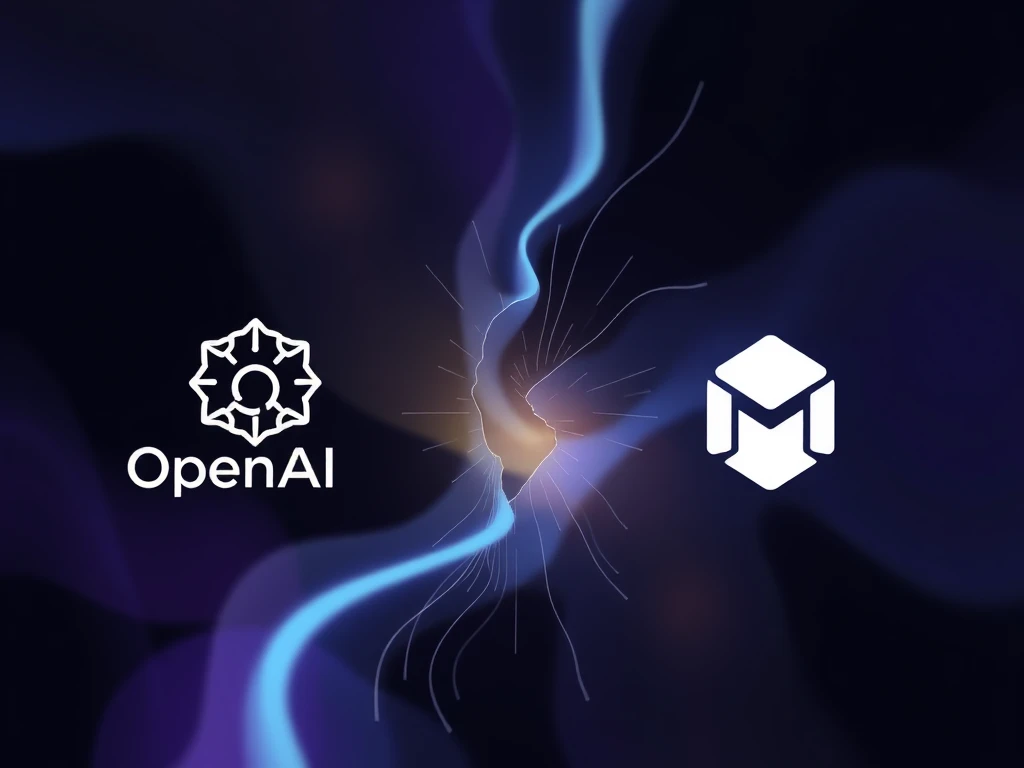OpenAI Cuts Ties: Dramatic Shift After Scale AI’s Meta Deal

In the fast-paced world of artificial intelligence, where breakthroughs can significantly impact everything from decentralized networks to automated trading strategies, the source and quality of AI data are paramount. A significant development is unfolding with OpenAI, the company behind ChatGPT, making a crucial decision regarding its data suppliers. This move highlights the intense competition and strategic maneuvering happening at the highest levels of the AI industry, impacting key players like OpenAI and Scale AI.
Understanding the OpenAI and Scale AI Partnership
For years, companies building sophisticated AI models have relied heavily on specialized services to prepare the vast amounts of data needed for training. This process, known as Data Labeling, involves tagging, annotating, or classifying raw data like images, text, and audio so that AI algorithms can learn from it. Scale AI established itself as a major player in this field, providing these essential data labeling services to many leading AI labs, including OpenAI, Anthropic, and Cohere.
Scale AI built its business by initially leveraging a large workforce of contractors for tasks like labeling images and text. As AI models became more complex, the company adapted, hiring more skilled contractors to handle sophisticated data preparation needs. Their role as a data supplier was foundational for many AI companies developing cutting-edge models.
The Impact of Meta’s Deal on Scale AI
The landscape of AI partnerships saw a dramatic shift following Meta’s recent announcement. Meta, the parent company of Facebook and Instagram, revealed a significant investment in Scale AI. This deal, reportedly valued at $14.8 billion for a 49% ownership stake, is Meta’s second-largest acquisition and includes Scale AI CEO Alexandr Wang joining Meta’s experimental AI initiatives. The news of this Meta Deal broke on June 12.
While Scale AI interim CEO Jason Droege stated the company “remains, unequivocally, an independent company” and is committed to protecting customer data, the substantial stake taken by a direct competitor like Meta has raised concerns across the industry.
Why OpenAI is Shifting its AI Data Strategy
Following the announcement of Meta’s investment, reports emerged that OpenAI is scaling back its contracts with Scale AI. This decision isn’t entirely new; an OpenAI spokesperson indicated they began phasing out contracts over the past year. The reasons cited for this shift are twofold:
- Seeking Specialized AI Data: OpenAI is increasingly looking for more specific and tailored data sets to train its advanced AI models, suggesting Scale AI’s general services might no longer meet all their evolving needs.
- Competitive Concerns: The major investment by Meta, a key competitor in the AI space, has fueled concerns that Meta could potentially gain insights into the AI development pipelines of companies using Scale AI’s services. This risk appears to be a significant factor in OpenAI’s decision to reduce reliance on Scale AI data.
This move highlights the strategic importance of AI Data sourcing and the potential conflicts of interest that can arise when core service providers become closely tied to major competitors.
Google’s Perspective on Data Labeling Partners
OpenAI is not the only major tech company reportedly reconsidering its relationship with Scale AI post-Meta deal. According to reports, Google is also phasing out its contracts with the data labeling startup. This mirrors OpenAI’s concerns, indicating a broader industry apprehension that Meta’s investment could provide them with an unwelcome window into competitors’ AI development efforts through their data processing activities.
The reactions from both OpenAI and Google underscore the sensitivity surrounding data used for AI training and the need for perceived neutrality and security from third-party data service providers.
The Future of AI Partnerships and Data Labeling
As OpenAI moves away from Scale AI, it is exploring alternative data suppliers. Newcomers in the sector, such as Mercor, are reportedly among the companies OpenAI is now considering for its data needs. This shift could open opportunities for other data labeling and AI data preparation companies.
The situation with OpenAI, Scale AI, and Meta serves as a clear example of how strategic investments and competitive dynamics can quickly reshape partnerships within the AI ecosystem. It emphasizes the critical role of secure and independent data labeling services for companies pushing the boundaries of AI development. The need for diverse and specialized AI Data sources will likely continue to grow, driving innovation in the data preparation market.
In conclusion, OpenAI’s decision to reduce its reliance on Scale AI following Meta’s significant investment is a pivotal moment in the AI industry. Driven by both the need for more specialized data and concerns over competitive intelligence, this move underscores the strategic importance of AI data pipelines and the potential risks associated with key service providers becoming closely aligned with major industry rivals. As AI continues to evolve, the dynamics of data partnerships will remain a critical area to watch.






